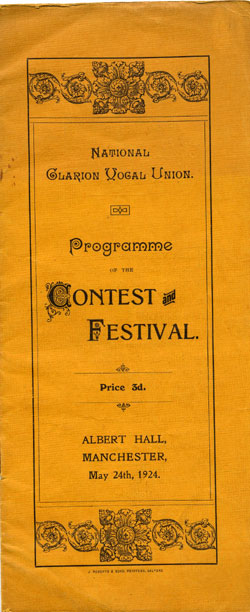
![]()
History
Contributed by Michael Walker of Unison.
A short history of the Clarion Vocal Union
Montague Blatchford wrote a series of articles on choral singing in The Clarion, and as a result of these articles singing classes and choirs were formed in different parts of the country. By the middle of 1895 more than a dozen of these choirs had been formed, and Montague Blatchford had become leader of the Clarion Vocal Union movement nationally. His stated object was 'to encourage unaccompanied vocal music [performed] creditably and with understanding'. By far the biggest local group was in his hometown, Halifax, where by 1895 there were 146 members plus an 'elementary class' of 48, and an orchestra.
The average weekly attendance for rehearsals was 120, and Mont Blong was teacher and conductor. It was in South Lancashire and the West Riding of Yorkshire that the CVUs, like the Cycling Clubs, took deepest root; and soon they were eager to arrange inter-club meets. Hardcastle Crags, a beauty spot near Hebden Bridge in Yorkshire, not far from the border with Lancashire, became a regular venue for CVU picnics and outdoor concerts. At the first of these gatherings, on Saturday 1st June 1895, there were present about a hundred Clarion members, with 150 relatives and friends. Many came on their bikes, proudly wearing the new silver badges pinned in their caps. The mixture, according to the report in the paper, was of 'sandwiches, laughter, tea, tobacco and singing'. There was also a thunderstorm, followed by a rain-soaked dash to the railway station where songs echoed round the platforms as they waited for their trains home.
Glasgow and Bristol both had choirs by 1896, when national CVU membership reached 1,250. The second Hardcastle Crags Meet that year attracted more than 2,000 people to listen to massed choirs on the hillside, and speeches by Caroline Martyn and Keir Hardie. On Jubilee Day, 1897, a big rally was held at Bolton Woods, and so much enthusiasm was displayed that it was resolved to have a joint Concert and Contest each year.
In May 1899 the first CVU United Concert at the Free Trade Hall in Manchester took place, with 450 singers in fourteen choirs competing for the ivory and gold Challenge Baton which had been presented by the Clarion Board. This was to be an annual event for the next thirty years, bringing hundreds of Clarionettes to Manchester, cyclists and non-cyclists alike. Songs were specially written (like the 'Song of the Clarion Scout') and poems were set to music to form an extensive Socialist repertoire. Young composers and musicians were drawn to the cause, like Gustav Holst, who was a regular cyclist and often rode with his trombone strung across his back.
While studying at the Royal College of Music and living in a bed-sitter in Hammersmith, Holst became the first conductor of the Socialist Choir there. He wrote reports for The Clarion about the choir, one of whose members was his future wife Isobel. Holst's fellow student Rutland Boughton, set poems by William Morris to music, and they appeared in the Clarion Song Book published in 1906. The Clarion Board of Directors presented a Baton of ivory and gold which has been keenly contested for, and, until 1915, Annual Contests took place without a break. In 1915, the Contest, which should have taken place in Sheffield, had to be abandoned owing to lack of railway facilities, and it was only in 1922 that, on a small scale,it was revived. A major Clarion Vocal Union festivial was held at the Manchester Albert Hall on 24th May 1924, with choirs from Bradford, Hyde, Leeds, Oldham, Rochdale, Sheffield and Manchester (I believe won by Bradford CVU).
The Baton was won in 1923 by the Sheffield Choir. Although the actual contest adds a zest to the evening's enjoyment, the best part of the Concert has always been the singing by the massed Choirs. Unaccompanied pieces are generally chosen, and these range from the glees and madrigals of the Elizabethan masters to the part songs and folk song arrangements of modern composers. Clarion Choirs still exist in Birmingham, Sheffield and Nottingham.
